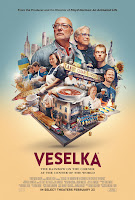the traveler's resource guide to festivals & films
a FestivalTravelNetwork.com site
part of Insider Media llc.
Film and the Arts
Off-Broadway Play Review—“Russian Troll Farm” with Christine Lahti
- Details
- Parent Category: Film and the Arts
- Category: Reviews
- Published on Sunday, 03 March 2024 16:32
- Written by Kevin Filipski
 |
| Christine Lahti and Haskell King in Russian Troll Farm (photo: Carol Rosegg) |
February '24 Digital Week II
- Details
- Parent Category: Film and the Arts
- Category: Reviews
- Published on Thursday, 29 February 2024 00:02
- Written by Kevin Filipski
Off-Broadway Play Review—Kate Douglas’ “The Apiary”
- Details
- Parent Category: Film and the Arts
- Category: Reviews
- Published on Tuesday, 27 February 2024 03:20
- Written by Kevin Filipski
 |
| Taylor Schilling and Nimene Wureh in The Apiary (photo: Joan Marcus) |
National Symphony Orchestra & “Fall of the Weimar Republic: Dancing on the Precipice”
- Details
- Parent Category: Film and the Arts
- Category: Reviews
- Published on Thursday, 22 February 2024 21:05
- Written by Jack Angstreich

Gianandrea Noseda & James Ehnes with the National Symphony Orchestra. Photo by Stefan Cohen
At Stern Auditorium, on the night of Monday, February 12th, I had the enormous pleasure of attending a superb concert—as part of Carnegie Hall’s current festival, “Fall of the Weimar Republic: Dancing on the Precipice”—presented by the sterling musicians of the National Symphony Orchestra under the exceptional leadership of Music Director and Conductor, Gianandrea Noseda, who recently led the New York Philharmonic in an extraordinary program of works by Wolfgang Amadeus Mozart and Gustav Mahler at Lincoln Center.
The event began auspiciously with a confident account of Alban Berg’s Three Pieces from the Lyric Suite, which is surprisingly accessible for an atonal piece and was beautifully arranged for string orchestra in 1928, although originally composed for string quartet. In the initial Andante amoroso movement, the composer created a solemn atmosphere that becomes more agitated; it closes suddenly and unexpectedly. The second movement might be described as skittish, even if much of it ispianissimo,but it grows more animated, also concluding abruptly. The final Adagio appassionato too is grave in sensibility with both slower and more propulsive passages, ending powerfully.
The renowned soloist James Ehnes then entered the stage for an excellent performance of the splendid Violin Concerto of Erich Korngold. The first movement—which is marked Moderato mobile and begins lyrically, becoming more dynamic in tempo, but with reflective moments—drew applause. The Andante that follows is even more passionately Romantic in inspiration even if it is not without its eccentricities. The Finale—Allegretto assai vivace—is energetic, virtuosic, buoyant in mood, and concludes triumphantly. An enthusiastic ovation elicited two impressive encores from Ehnes: the Violin Sonata No. 3 in D Minor, "Ballade,” of Eugène Ysaÿe—which is both a bravura work and one of considerable seriousness—and the magnificent Largo from the Solo Violin Sonata No. 3 in C Major, BWV 1005, of Johann Sebastian Bech
The second half of the evening was even more memorable, a brilliant rendition of Ludwig van Beethoven’s extraordinary Symphony No. 3, the “Eroica.” The first movement, with a tempo marking of Allegro con brio, has a certain majesty but is often suspenseful and dramatic—although with some meditative episodes—and contains a fugue-like section, while the second, an Adagio assai funeral march, is contrastingly gloomy but gains in intensity. The ensuing Scherzo, an Allegro vivace, is characteristically playful if turbulent; the more jubilant Trio has a pastoral quality. In his program note, Peter Laki wrote this about the Allegro molto that closes the work:
The main theme of the last movement appears in no fewer than four of Beethoven’s compositions. Beethoven first used it in a simple contradance for orchestra, then in the last movement of the ballet The Creatures of Prometheus (both in 1800–1801), followed by the Variations for Piano, Op. 35 (1802), and lastly in the Third Symphony. The elaborate set of variations in the “Eroica” finale is integrated into a single, continuous musical form, culminating in a short Presto section that gives the symphony its dynamic conclusion.
After a more tentative introduction, the music acquires a pronouncedly affirmative character, with fugue-like interludes, ending exultantly.
More Articles...
Newsletter Sign Up














